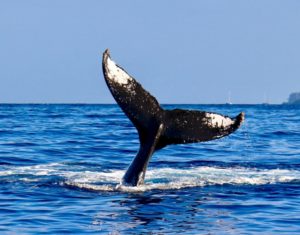By Chloé Gurdjian, February 18th, 2020, Shared from https://www.7sky.life/
Would whales be much more efficient than trees at absorbing CO2?
The result of this study may come as a surprise, and yet it is all the more serious. Whales would be powerful allies in the fight against global warming.
As the fight against global warming intensifies, the International Monetary Fund (IMF) has allied itself with the Great Whale Conservancy (GWC). Their objective: to quantify the contribution of whales in this fight. And the result is quite surprising. The whales would be veritable carbon pumps. Migratory animals, they travel the seas of the globe, leaving feces in their wake. Rich in iron and nitrogen, their excrement floats to the surface. There, they serve as food for phytoplankton, who love them. And this plant organism is essential. “These microscopic creatures not only produce at least 50% of the planet’s oxygen, but they also absorb about 37 billion tons of CO2, or about 40% of all CO2 produced,” the study details. To put things in perspective, we calculate that this is equivalent to the amount of CO2 captured by 1.7 trillion trees, the value of four Amazonian forests.”
But that’s not all. These marine mammals, which feed a lot on phytoplankton, accumulate carbon in their bodies throughout their long life. “When a whale dies and sinks to the bottom of the ocean, it traps 33 tons of CO2 on average, removing this carbon from the atmosphere for centuries,” continues the study. By comparison, a tree absorbs only up to 48 kilos of CO2 per year.”
With all these elements, the IMF and researchers estimated, taking into account the role played by whales in carbon sequestration, the increase in fish stocks and tourism, that the current population of these mammals would be worth more than 1 000 billion dollars (about 900 billion euros). Finally, one whale would contribute about $2 million (‘1.8 million) to global ecosystem services.
“The value of the functions provided by whales in the ocean/land system (…) should be included in the assessment of the cost of protecting them,” the IMF estimated. Ralph Chami, Deputy Director of the IMF and main author of the article, even indicated that, “given the irreplaceable role of cetaceans in reducing the effects of climate change and in building resilience to these effects, their survival should (…) be integrated into the objectives of all the signatories of the Paris Agreement on Climate Change”. For his part, Michael Fishbach, Director of GWC, states that “the IMF article clearly indicates that the recovery of whale stocks is an important lever for strengthening the ocean’s carbon sequestration potential, but also for improving the health of the ocean and its capacity to produce oxygen. Saving whales helps save the planet, it’s as simple as that.”
Source: www.geo.fr
greatwhaleconservancy.org/
https://www.euronews.com/living/2019/10/30/saving-the-whales-could-help-save-humanity-too






